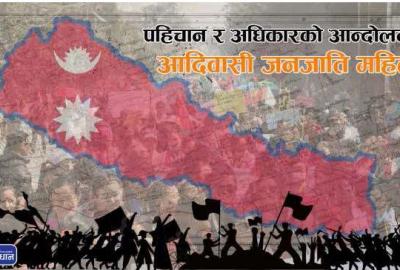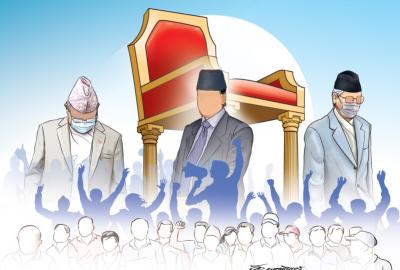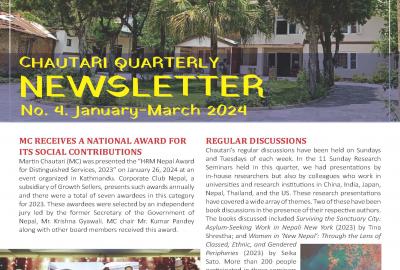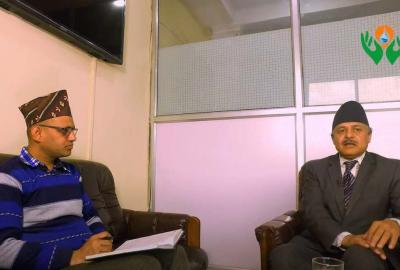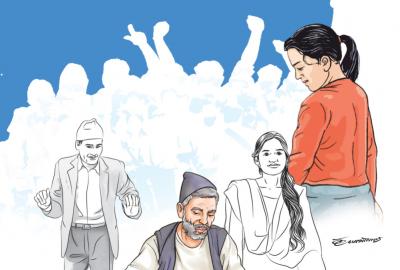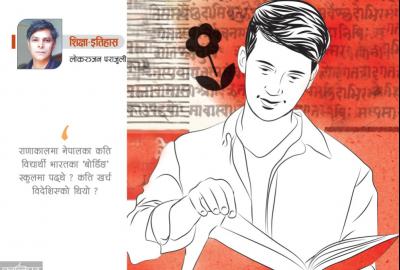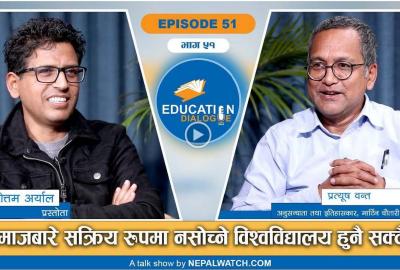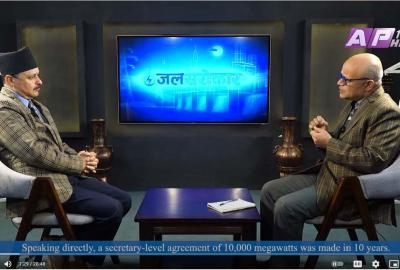Martin Chautari (henceforth Chautari or MC) began as an informal discussion group in Kathmandu in October 1991, allowing development professionals, social activists and academics to meet every two weeks to share insights and experiences related to Nepali development and society. The founders of this discussion group included the Nepali power engineer Bikas Pandey, the Norwegian engineer Odd Hoftun and his academic son Martin Hoftun. In 1995, the name ‘Martin Chautari’ was adopted in memory of the junior Hoftun, who was tragically killed in an airplane accident in 1992.
Since its inception, Chautari’s core objective has been to enhance the quality of public dialogue in Nepal, particularly in matters pertaining to development, democracy, media, and social justice. Even as other activities – research, research training, publications and a library open to the public – have been taken up, Chautari’s discussion series continue to be its most-known work. MC currently organizes three scheduled discussions a week.
Discussion series
The founders of the discussion series conceptualized this program as the creation of a public space for open and informed dialogue about themes related to development and democracy in Nepal. Coming about a year after the promulgation of the Constitution of Nepal, 1990, they wanted to build upon the fundamental rights guaranteed by that Constitution. In particular, they wanted to exercise the right to freedom of thought and expression and the right to assemble peacefully. Passionate in their concerns about Nepal's development, they wanted to build upon these rights to create a public forum in which Nepalis and friends of Nepal could openly discuss various themes and experiences regarding Nepali development and society.
In 1991-92, this series used to be held every other Tuesday in Kamaladi at the office premises of one of its founders, Bikas Pandey. In early 1992 when I returned to Nepal to begin my doctoral research and joined this group, the number of participants used to be between five and ten individuals. Regulars included Manjushree Thapa (the now famous writer), the late Dr Chandra Gurung (who was then doing interesting development stuff with Bikas as described by Manjushree in her book The Boy from Siklis), and anthropologist Dr Rajendra Pradhan (who later founded the Social Science Baha).
Other regulars included, Anna Robinson-Pant (who later finished a PhD on women's literacy in Nepal and currently teaches at the University of East Anglia) and her social activist husband Mahesh Pant (who was then associated with the NGO Atma Nirbhar Bikas Manch and its interesting magazine, Bikas). Development issues dominated the chosen topics for discussion as this was the primary interest area of the founders.
By 1994, the venue had moved to an apartment in the Thapathali area that was occupied by Odd Hoftun only when he was visiting Kathmandu. Apart from Bikas, others such as the environmentalist Bhushan Tuladhar and the journalist Manisha Aryal were key in keeping the discussion series alive until 1995. That year, a building in the same area was rented and the discussion series was shifted to this venue. Because the original discussion series used to meet on alternate Tuesdays, it also acquired the name 'Manglebare' from the Nepali word Mangalbar for Tuesday.
In 1996, I started another fortnightly discussion series, one that used to meet on alternate Thursdays. This series focused mostly on academic research on Nepal. In 1997 the two series were merged and Manglebare became a weekly affair. Another fortnightly and subsequently weekly series that focused just on the media was started in 2001. This series meets on Thursdays.
In 2003, as Nepal's political troubles worsened, another weekly discussion, meeting on Sundays, was started as an effort to attain clarity regarding Nepal's fast changing political landscape. During the past decade, Bhaskar Gautam, Shekhar Parajulee, Krishna Adhikari, Kailash Rai, Harsha Man Maharjan, and Sangita Pandey have taken up large shares of the responsibility of organizing these discussions. Anubhav Ajeet has been mostly responsible for selecting the films for viewing for the past five-six years.
In the recent past, especially when the number of participants has dwindled, there have been internal calls to discontinue at least one of the current three series. But when meetings have been called amongst Chautari members and staff to make final decisions, discussion series have always survived to be held the next few months. Members and staff have resolved to save the series and do their part in further promoting them.
One such meeting in early 2010 decided to re-brand two of the three on-going series. As a result the Sunday series has now become a research seminar series. The original Tuesday series has now been re-branded as 'literature, arts and politics series.' The Thursday series remains as one focused on the media with alternate showing of films/documentaries.
Fixing topics and speakers
Topics for discussions and presentations are fixed by a number of MC members and staff in one of many ways. The following considerations influence the selection of topics and speakers. For the first Sunday seminar of the month, a speaker who has done research on education is usually invited. The other topics for the research series are determined by the individuals who MC invites for presentations. Foreign researchers who plan to visit Kathmandu are often asked to present their work in this series.
For the literature and books part of the Tuesday series, its coordinators usually select new books for discussion and then invite its author, editors or critics to comment upon them. The single monthly meeting on politics is meant to bring into focus the latest developments in Nepali politics. The media discussions are fixed in one of two main ways: first, if there is a public debate on a media-related topic, some of its participants are invited to lead discussions. Second, other discussions are led by individuals who have completed some research on a media-related topic.
News about discussions and seminars to be held at Martin Chautari are promoted in a number of ways. Future discussions are always announced at Chautari functions. Schedule posters are printed and distributed. They are also posted at Chautari's bulletin board and elsewhere. Chautari maintains an email list with over 1750 names. Every week, on Thursdays, an email with information on the discussions that are to take place the following week is sent out to these individuals. The same information is also uploaded in MC's website www.martinchautari.org.np. It is also sent to major media outlets and occasionally listed under the 'Events' section in major newspapers (such as this one) and also broadcast over some FM stations in Kathmandu.
The event
The main speaker or presenter is asked to arrive at Chautari premises in Thapathali about 5-15 minutes before the scheduled time of their presentation (which is mostly 3pm). The speaker and the participants are usually seated on the carpeted floor with cushions. The event usually begins on time barring occasional delays due to the late arrival of the speakers. The speaker is usually introduced by her MC host who also asks all participants to introduce themselves briefly. Sometimes there are more than one speaker.
Once the introduction is over, the speaker speaks for about 30-45 minutes which is then followed by an open discussion moderated by the MC host. Usually the main speaker is expected to take each question one at a time. The whole event is usually over in about 90-100 minutes. If the main speaker or participants are not in a rush, they are encouraged to hang around in the discussion hall for some more informal guff. Tea is served for free these days. In the early days participants were expected to contribute Rs 5-10 for tea.
The program is also recorded and an archive of such recordings is available for researchers. MC does not put out press releases (in any media) of such discussions. Journalists who want to report on what was said at these discussions and seminars – and they do come occasionally, sometimes with their camera crew – are expected to take the permission of the concerned speaker and participants before quoting them.
In recent years, about 30 people on average have attended Chautari's discussions, although the attendance seems to vary quite a bit. When some of Nepal's most famous writers or commentators are the speakers, more than 80 people have participated. At other times, there have been less than 10 folks. Most participants are young males; previous efforts to increase the number of female participants have not been too effective.
An overwhelming majority of speakers have been male. Efforts to make the gender balance of speakers more even are on-going but results have not been too impressive. One such effort started in 2008 requires that all speakers for regularly scheduled discussions during the month of March have to be women. March has been chosen because 8th of March is the International Women's Day.
Results
In 18 years of discussions, what has been achieved? This is best answered by those who have attended the discussions without having to organize them. Over the years such individuals have told MC members that these guff sessions have worked to increase informed public debates and political spaces in a non-partisan way in Nepal. Others have said that these series have encouraged the free exchange of ideas and contributed to the emergence of a public sphere outside of the patronage of the Nepali state and the development industry.
Speaking for myself, these discussions have been an extremely valuable continuing education platform. They have helped me to understand the contemporary history and society of Nepal in ways that are very important to my life, both in an academic and personal sense. It is rather surprising how much one can learn and get excited about ideas presented in these unpretentious sessions.
You don't have to believe my words. Come see for yourself.
Published in Republica, 19 Feb 2010
